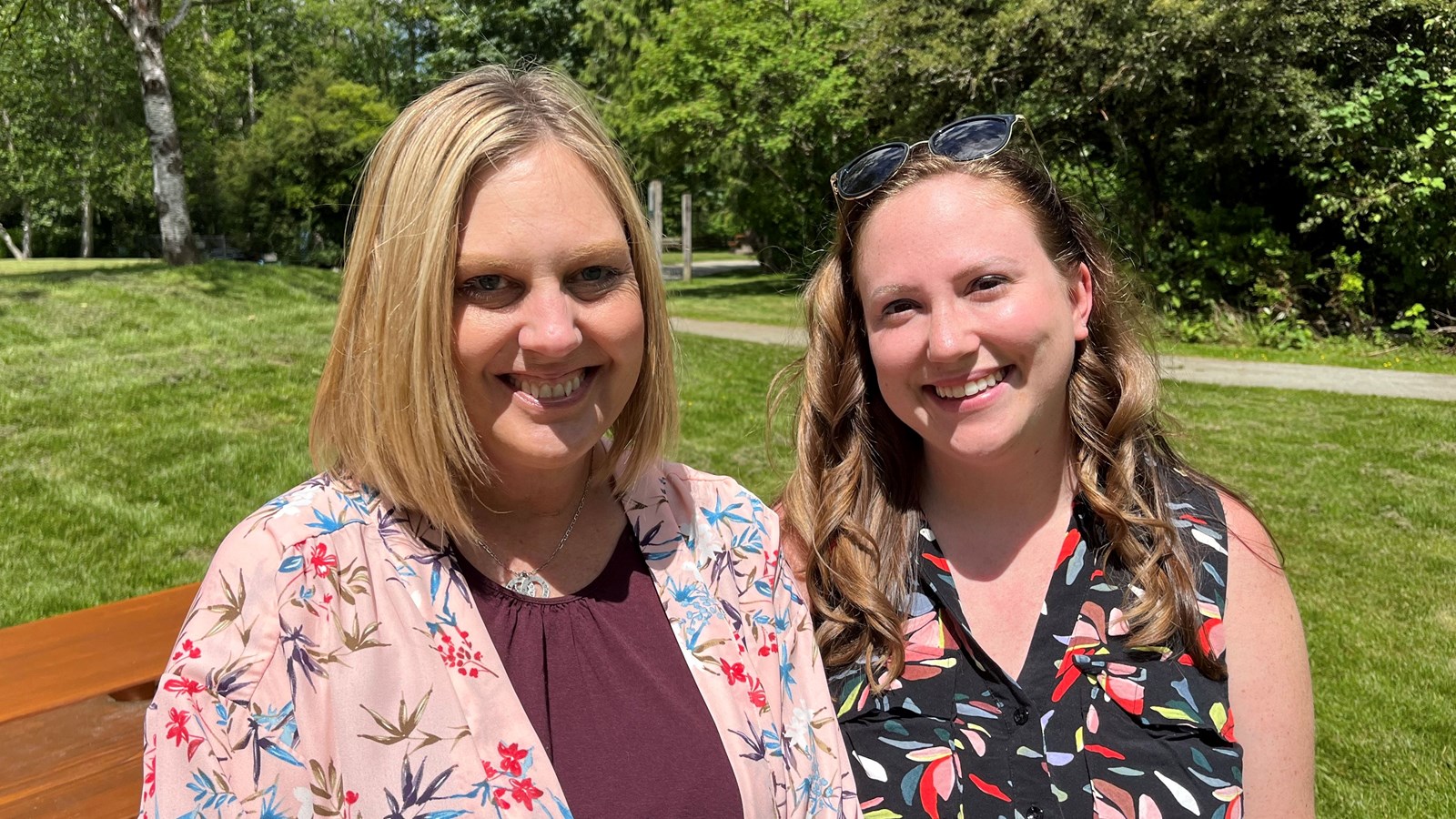Student Support Q&A: Speech Language Pathologists
 District speech language pathologists Jennifer Wiegert and Brynn Davies share their experiences as SLPs and what the day-to-day of their work entails.
District speech language pathologists Jennifer Wiegert and Brynn Davies share their experiences as SLPs and what the day-to-day of their work entails.
The district’s Student Support staff play a significant role in the lives of many of our students and their success both in school and in life.
To recognize their important work and provide a greater understanding, the district is diving deeper into their roles and responsibilities and highlighting the positive impact they have on students and families every day. Today, we’re showcasing Brynn Davies and Jennifer Weigert, who highlight the roles of both school-based Speech Language Pathologists (SLPs) and Augmentative Alternative Communication SLPs.
Please explain what you do in your role as a Speech Language Pathologist. What types of students do you typically work with and how are they referred to you?
In the district, there are two different roles for Speech-Language Pathologists (SLP).
The first role is school-based, we work primarily with students on their ability to understand and use language and their ability to clearly articulate words. Students are referred to us through their teachers, usually for difficulties with their speech being understood, with producing certain speech sounds, following directions, providing related answers, telling stories in an organized way or being able to access language and express themselves in a reliable manner.
In this role, we work on following directions, increasing complexity of utterances, correctly producing words, having smooth speech when talking, understanding what we hear, finding the words we want to communicate, and learning phonological awareness skills and other fundamentals of reading. We provide home programs, assessments, direct therapy and consultation for the classroom.
The second role is an Augmentative Alternative Communication Specialist. AAC SLPs work primarily with higher needs students who have less than 50 functional words, are highly unintelligible and/or require alternate means of communication such as using their finger, hand or eyes to access technology.
In this role, we assess the students to determine what type of supports they need to facilitate their communication skills and provide students with a variety of communication systems. We play an important role in determining what visual supports are required to follow routines, complete activities, and maintain regulation throughout the school day. We also support teams on how to access literacy and interact with books, increase classroom inclusion and foster peer interactions.
We support the students’ team through collaborating on systems, training in person on how to implement them and offering frequent professional development opportunities. We also work closely with a variety of other professionals that may be on the student’s team.
How do you see your work impact the students you work with?
I see my work impacting students in a variety of ways. The students who are referred to us are often thought of as students that have bad or disruptive behaviour, but by working on their speech and language, they increase their ability to get their needs met, are able to interact more successfully with peers and have meaningful interactions with people. They are also able to decrease the frustration that comes from not being understood or understanding what is being said or going on, from not being able to share the thought in their head, from their communication attempts being avoided due to misconceptions of them being meaningless, and from being isolated.
Through working with them, we are able to help them communicate with family and friends, feel understood and determine ways that they can be successful.
The other way I see my work impacting students is through advocating for them, such as for the support or a system that they may need, or for them to be seen as a person. It can be easy to assume that because a person can’t answer your question that they don’t understand anything, but for many of our students, this is not the case. Advocating for them can include sharing that spoken output does not equal understanding and that we should talk to them as a person, that we should not talk about them in front of them, it can also include sharing that all behaviour is communication.
What do you find most rewarding and/or what inspires you in your day-to-day work?
As a school-based SLP, it’s the fact that some of my students look forward to interacting with me because they feel understood, literally or figuratively. Being able to understand them and work with them to get to a point where they can get their ideas out in a way where others can understand them is what I find the most rewarding.
As an AAC SLP, it’s being able to connect with a student, have a meaningful interaction, and find a system that will help them have more meaningful connections with others.
It is very rewarding to see how our training is increasing the skills of our education assistants throughout the entire school district. They have become much more knowledgeable about non-speaking individuals and how they communicate in ways other than verbal speech. We have built capacity among support staff by increasing their understanding of how those students learn and how to implement support of AAC systems which results in students making more progress throughout the school year.
Are there any other details you wish to share?
We continue to explore new and creative ways to educate classroom teachers, education assistants and administration about what supports our students need to make progress and access their educational programs. We have developed an online AAC Resource Bank which education assistants and Integration Support Teachers can access to download visual support templates, activities and lesson plans to implement with their students.
The AAC department offers weekly “drop in” hours in which staff can problem solve specific student needs and determine what they can do to better support those students.

